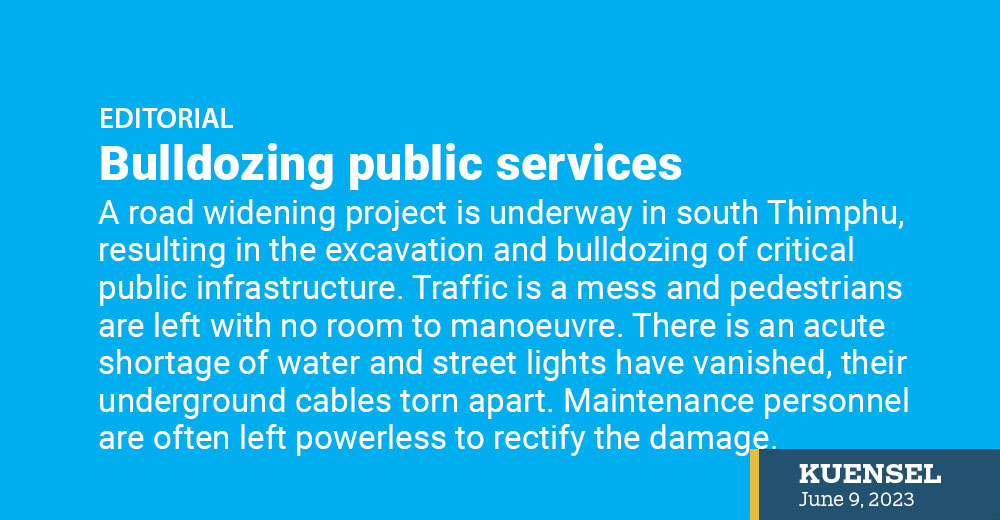A road widening project is currently underway in south Thimphu. The road, from the start of the expressway or Zero, as many call it, to Semtokha needs widening. The traffic has increased and the rise in population density due to the transformation of the once serene pine tree forest into residential areas has exacerbated the need for wider roads.
However, the execution of the widening works has left the community complaining, with some residents expressing their readiness to confront the workers involved in the project. Within a week, the project resulted in the literal excavation and bulldozing of critical public infrastructure. Water lines, electric cables, and any other installations laid alongside the road have been ruthlessly ripped open, leaving some damaged beyond repair.
The road has become narrower as the sides are dug up. Traffic is a mess and motorists find themselves locked in eye-to-eye confrontations, while pedestrians, suffocating in clouds of dust stirred up by passing vehicles, are left with no room to manoeuvre.
There is an acute shortage of water. The little that the thromde supplies do not reach homes as supply lines are fractured including the Thromde’s main supply line. Maintenance personnel respond promptly to alerts, yet they are often left powerless, unable to rectify the damage before the one-hour water supply window ends. Adding to the woes, the street lights have vanished, their underground cables torn apart.
Unfortunately, the indiscriminate bulldozing of infrastructure is not an uncommon occurrence. It happens every day everywhere to public or private infrastructure. The fundamental principle when improving public infrastructure should be to avoid or minimize disruptions to existing services. Regrettably, it appears that contractors involved in the current widening project have overlooked this aspect entirely.
Those angry with the damage caused are wondering why works are not executed in phases. While there may be engineering justifications for excavating the entire stretch of the road simultaneously, it is inconceivable that damaging the already laid services was part of any reasonable plan or engineering strategy.
The work will not end with the widening. Looking at the haphazard approach, it will have to be dug again to fix the broken water lines and cables. Desperate residents are happy to see their water lines restored as there is an acute shortage. But there is no accountability. Some are taking it into their own hands. A group of passersby prevented an altercation between an angry resident and workers digging up their water pipes.
The completion of the widening project will not mark the end of the roadworks. The road will need to be dug up once again to repair the broken water lines and cables. Given the extensive destruction caused, residents are happy to endure the inconvenience of a narrow road if it means having access to clean drinking water. The frustration stems from the consistent disruption of essential services.
It is high time we re-evaluate the manner in which we repair and maintain our roads, drains, and other vital infrastructures. As the capital city continues to grow and become increasingly congested, numerous expansions will be necessary. What is happening in Semtokha and Babesa today will soon be replicated in other areas, subjecting residents to the same inconveniences and disruptions. Surely, there must be a more effective approach to repairing and maintaining our basic infrastructures.


